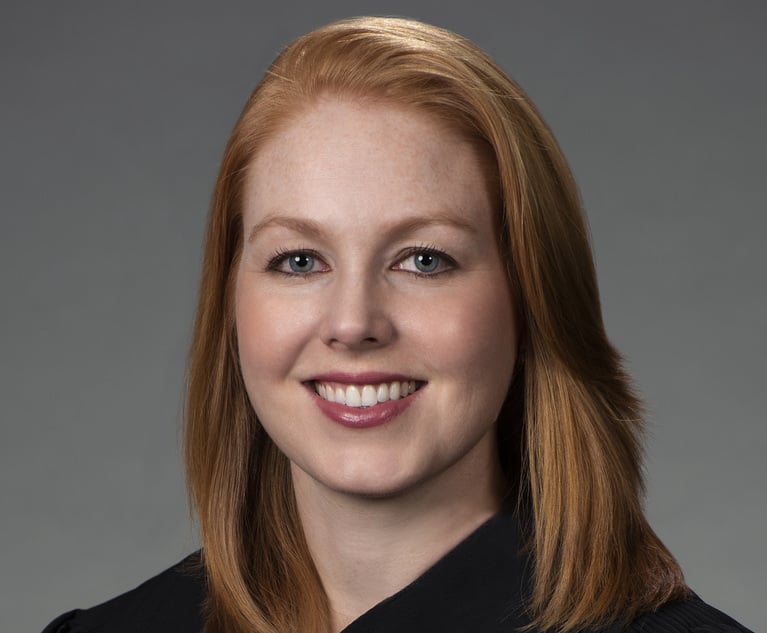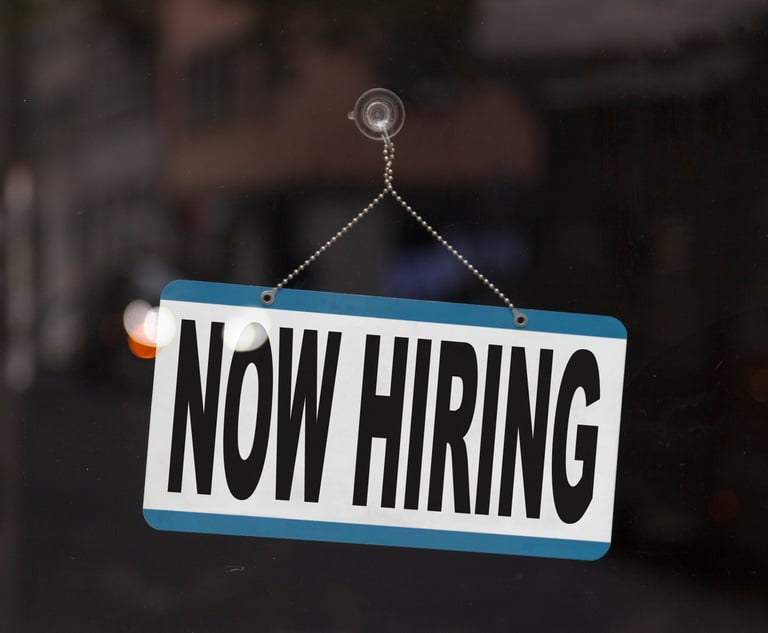Meet the Members: New Legal Committee to Address 'Civil Justice Gap'
"This committee will use data-driven methodologies to be innovative in exploring and discerning what regulatory reforms could address the issues preventing Georgians from receiving critical civil legal services without diminishing consumer protections," said committee chair Justice Carla Wong McMillian in a statement Thursday.
October 31, 2024 at 01:06 PM
4 minute read
What You Need to Know
- Supreme Court of Georgia launches committee to address civil justice gap common in rural communities.
- The Supreme Court Study Committee on Legal Regulatory Reform is made up of 13 members, including judges and lawyers.
- Committee is tasked with developing recommendations that improve access to civil legal services for rural or low-income Georgians by June 2025.
 Credit: scharfsinn86/Adobe Stock[/caption] [caption id="attachment_144244" align="alignright" width="200"]
Credit: scharfsinn86/Adobe Stock[/caption] [caption id="attachment_144244" align="alignright" width="200"] Justice Carla Wong McMillian of Supreme Court of Georgia. Courtesy photo[/caption] Having limited access to justice is a scary reality for some Georgians situated in legal deserts characterized by the presence of few, if any, licensed attorneys. In time for Halloween, the Supreme Court of Georgia has announced a new committee aimed at addressing what some consider a frightful gap in civil justice—fueled by a rural lawyer drought—with the launch of the Supreme Court Study Committee on Legal Regulatory Reform. "This committee will use data-driven methodologies to be innovative in exploring and discerning what regulatory reforms could address the issues preventing Georgians from receiving critical civil legal services without diminishing consumer protections," said committee chair Justice Carla Wong McMillian in a statement Thursday.
Justice Carla Wong McMillian of Supreme Court of Georgia. Courtesy photo[/caption] Having limited access to justice is a scary reality for some Georgians situated in legal deserts characterized by the presence of few, if any, licensed attorneys. In time for Halloween, the Supreme Court of Georgia has announced a new committee aimed at addressing what some consider a frightful gap in civil justice—fueled by a rural lawyer drought—with the launch of the Supreme Court Study Committee on Legal Regulatory Reform. "This committee will use data-driven methodologies to be innovative in exploring and discerning what regulatory reforms could address the issues preventing Georgians from receiving critical civil legal services without diminishing consumer protections," said committee chair Justice Carla Wong McMillian in a statement Thursday. 'Come Up With Meaningful Solutions'
According to the court statement issued Thursday, Supreme Court of Georgia Chief Justice Michael P. Boggs ordered the creation of the 13-member committee to address the state's civil justice gap that often prevents many rural or low-income Georgia residents from acquiring legal representation in noncriminal matters.
Legal Deserts: Lawyers Are Fleeing Some Parts of This State Leaving 1M People Unrepresented
[caption id="attachment_122266" align="alignleft" width="200"]
 Presiding Judge Stephen Dillard of the Georgia Court of Appeals. Courtesy photo[/caption] Alongside McMillian, Georgia Court of Appeals Presiding Judge Stephen Louis A. Dillard will vice-chair the committee, tasked with developing recommendations to improve "access to civil legal services for rural or low-income Georgians by giving them more options while also maintaining high standards for legal practitioners" by June 2025. The remaining 11 committee members include judges from various classes of state courts and attorneys from a number of practice areas, and input will be sought from additional state court judges, lawyers, community partners and the public, according to the court announcement. As a central Georgia native of Macon, Dillard said he understood "how crucial it is to carefully examine this important issue." "I look forward to working closely with Justice McMillian and many other stakeholders to come up with meaningful solutions that will make justice more accessible and improve the lives of our fellow Georgians," Dillard said.
Presiding Judge Stephen Dillard of the Georgia Court of Appeals. Courtesy photo[/caption] Alongside McMillian, Georgia Court of Appeals Presiding Judge Stephen Louis A. Dillard will vice-chair the committee, tasked with developing recommendations to improve "access to civil legal services for rural or low-income Georgians by giving them more options while also maintaining high standards for legal practitioners" by June 2025. The remaining 11 committee members include judges from various classes of state courts and attorneys from a number of practice areas, and input will be sought from additional state court judges, lawyers, community partners and the public, according to the court announcement. As a central Georgia native of Macon, Dillard said he understood "how crucial it is to carefully examine this important issue." "I look forward to working closely with Justice McMillian and many other stakeholders to come up with meaningful solutions that will make justice more accessible and improve the lives of our fellow Georgians," Dillard said. Slideshow: Meet the Supreme Court Study Committee on Legal Regulatory Reform Members
Noting that the high court "is vested by the Georgia Constitution with the responsibility to regulate the practice of law to ensure that the public is protected and that the people of Georgia receive competent legal counsel," McMillian expounded on the potential for the committee to cultivate solutions to address the state's civil justice gap. "[T]here may be narrow areas where people who are not lawyers can be trained to serve clients who otherwise wouldn't be able to afford lawyers or who live in areas without lawyers," McMillian said. "There also may be ways to encourage new or existing lawyers to provide their services to indigent residents or in legal deserts."
Do It Yourself: For Many in Georgia, Legal Help Just Isn't Available
'Explore Innovative Opportunities'
[caption id="attachment_147739" align="alignleft" width="200"] Ivy Cadle, 62nd State Bar of Georgia president. Courtesy photo[/caption] With the stop clock now running on the committee's eight-month deadline, additional legal organizations are now committing their support. In addition to the National Center for State Courts offering technical assistance, the State Bar of Georgia has pledged its support. "We share the Supreme Court of Georgia's desire to explore innovative opportunities to serve the citizens of Georgia while balancing the mission of the legal profession: to protect the public and improve the quality of legal services," Cadle said. "We appreciate the opportunity to partner with the Court in evaluating opportunities and look forward to engaging the members of the State Bar in that effort."
Ivy Cadle, 62nd State Bar of Georgia president. Courtesy photo[/caption] With the stop clock now running on the committee's eight-month deadline, additional legal organizations are now committing their support. In addition to the National Center for State Courts offering technical assistance, the State Bar of Georgia has pledged its support. "We share the Supreme Court of Georgia's desire to explore innovative opportunities to serve the citizens of Georgia while balancing the mission of the legal profession: to protect the public and improve the quality of legal services," Cadle said. "We appreciate the opportunity to partner with the Court in evaluating opportunities and look forward to engaging the members of the State Bar in that effort."
NOT FOR REPRINT
© 2025 ALM Global, LLC, All Rights Reserved. Request academic re-use from www.copyright.com. All other uses, submit a request to [email protected]. For more information visit Asset & Logo Licensing.
Related Stories
View AllYou Might Like
View All
Justice Known for Asking 'Tough Questions' Resolves to Improve Civility
4 minute readTrending Stories
Who Got The Work
J. Brugh Lower of Gibbons has entered an appearance for industrial equipment supplier Devco Corporation in a pending trademark infringement lawsuit. The suit, accusing the defendant of selling knock-off Graco products, was filed Dec. 18 in New Jersey District Court by Rivkin Radler on behalf of Graco Inc. and Graco Minnesota. The case, assigned to U.S. District Judge Zahid N. Quraishi, is 3:24-cv-11294, Graco Inc. et al v. Devco Corporation.
Who Got The Work
Rebecca Maller-Stein and Kent A. Yalowitz of Arnold & Porter Kaye Scholer have entered their appearances for Hanaco Venture Capital and its executives, Lior Prosor and David Frankel, in a pending securities lawsuit. The action, filed on Dec. 24 in New York Southern District Court by Zell, Aron & Co. on behalf of Goldeneye Advisors, accuses the defendants of negligently and fraudulently managing the plaintiff's $1 million investment. The case, assigned to U.S. District Judge Vernon S. Broderick, is 1:24-cv-09918, Goldeneye Advisors, LLC v. Hanaco Venture Capital, Ltd. et al.
Who Got The Work
Attorneys from A&O Shearman has stepped in as defense counsel for Toronto-Dominion Bank and other defendants in a pending securities class action. The suit, filed Dec. 11 in New York Southern District Court by Bleichmar Fonti & Auld, accuses the defendants of concealing the bank's 'pervasive' deficiencies in regards to its compliance with the Bank Secrecy Act and the quality of its anti-money laundering controls. The case, assigned to U.S. District Judge Arun Subramanian, is 1:24-cv-09445, Gonzalez v. The Toronto-Dominion Bank et al.
Who Got The Work
Crown Castle International, a Pennsylvania company providing shared communications infrastructure, has turned to Luke D. Wolf of Gordon Rees Scully Mansukhani to fend off a pending breach-of-contract lawsuit. The court action, filed Nov. 25 in Michigan Eastern District Court by Hooper Hathaway PC on behalf of The Town Residences LLC, accuses Crown Castle of failing to transfer approximately $30,000 in utility payments from T-Mobile in breach of a roof-top lease and assignment agreement. The case, assigned to U.S. District Judge Susan K. Declercq, is 2:24-cv-13131, The Town Residences LLC v. T-Mobile US, Inc. et al.
Who Got The Work
Wilfred P. Coronato and Daniel M. Schwartz of McCarter & English have stepped in as defense counsel to Electrolux Home Products Inc. in a pending product liability lawsuit. The court action, filed Nov. 26 in New York Eastern District Court by Poulos Lopiccolo PC and Nagel Rice LLP on behalf of David Stern, alleges that the defendant's refrigerators’ drawers and shelving repeatedly break and fall apart within months after purchase. The case, assigned to U.S. District Judge Joan M. Azrack, is 2:24-cv-08204, Stern v. Electrolux Home Products, Inc.
Featured Firms
Law Offices of Gary Martin Hays & Associates, P.C.
(470) 294-1674
Law Offices of Mark E. Salomone
(857) 444-6468
Smith & Hassler
(713) 739-1250









